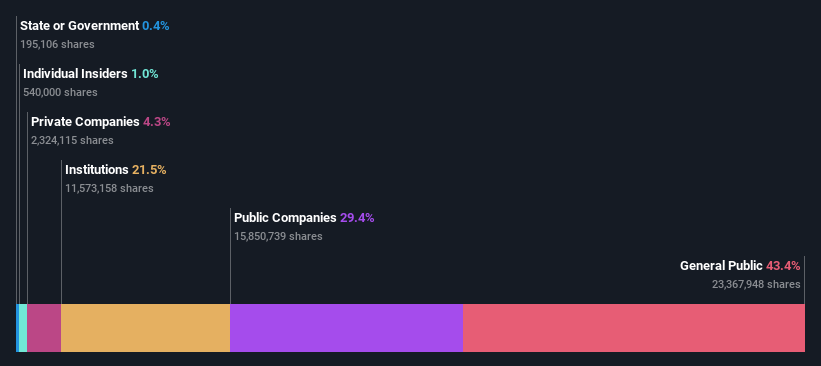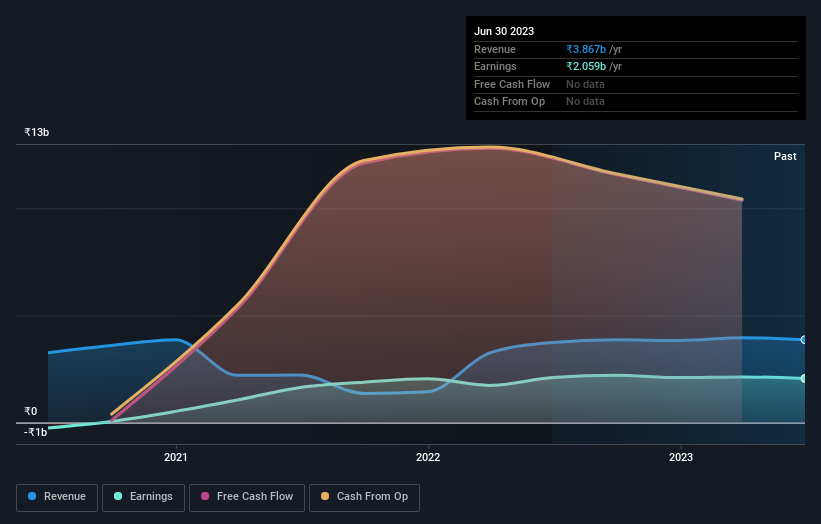Stock Analysis
- India
- /
- Diversified Financial
- /
- NSEI:GICHSGFIN
GIC Housing Finance Limited's (NSE:GICHSGFIN) market cap dropped ₹1.3b last week; Retail investors bore the brunt

Key Insights
- Significant control over GIC Housing Finance by retail investors implies that the general public has more power to influence management and governance-related decisions
- A total of 6 investors have a majority stake in the company with 53% ownership
- 21% of GIC Housing Finance is held by Institutions
A look at the shareholders of GIC Housing Finance Limited (NSE:GICHSGFIN) can tell us which group is most powerful. With 43% stake, retail investors possess the maximum shares in the company. That is, the group stands to benefit the most if the stock rises (or lose the most if there is a downturn).
And last week, retail investors endured the biggest losses as the stock fell by 11%.
Let's take a closer look to see what the different types of shareholders can tell us about GIC Housing Finance.
Check out our latest analysis for GIC Housing Finance

What Does The Institutional Ownership Tell Us About GIC Housing Finance?
Institutions typically measure themselves against a benchmark when reporting to their own investors, so they often become more enthusiastic about a stock once it's included in a major index. We would expect most companies to have some institutions on the register, especially if they are growing.
GIC Housing Finance already has institutions on the share registry. Indeed, they own a respectable stake in the company. This can indicate that the company has a certain degree of credibility in the investment community. However, it is best to be wary of relying on the supposed validation that comes with institutional investors. They too, get it wrong sometimes. If multiple institutions change their view on a stock at the same time, you could see the share price drop fast. It's therefore worth looking at GIC Housing Finance's earnings history below. Of course, the future is what really matters.

Hedge funds don't have many shares in GIC Housing Finance. Looking at our data, we can see that the largest shareholder is General Insurance Corporation of India with 21% of shares outstanding. The New India Assurance Company Limited is the second largest shareholder owning 8.6% of common stock, and United India Insurance Co. Ltd., Asset Management Arm holds about 7.3% of the company stock.
We also observed that the top 6 shareholders account for more than half of the share register, with a few smaller shareholders to balance the interests of the larger ones to a certain extent.
Researching institutional ownership is a good way to gauge and filter a stock's expected performance. The same can be achieved by studying analyst sentiments. As far as we can tell there isn't analyst coverage of the company, so it is probably flying under the radar.
Insider Ownership Of GIC Housing Finance
The definition of an insider can differ slightly between different countries, but members of the board of directors always count. Company management run the business, but the CEO will answer to the board, even if he or she is a member of it.
Insider ownership is positive when it signals leadership are thinking like the true owners of the company. However, high insider ownership can also give immense power to a small group within the company. This can be negative in some circumstances.
We can report that insiders do own shares in GIC Housing Finance Limited. In their own names, insiders own ₹104m worth of stock in the ₹10b company. This shows at least some alignment, but we usually like to see larger insider holdings. You can click here to see if those insiders have been buying or selling.
General Public Ownership
The general public-- including retail investors -- own 43% stake in the company, and hence can't easily be ignored. While this size of ownership may not be enough to sway a policy decision in their favour, they can still make a collective impact on company policies.
Private Company Ownership
Our data indicates that Private Companies hold 4.3%, of the company's shares. It might be worth looking deeper into this. If related parties, such as insiders, have an interest in one of these private companies, that should be disclosed in the annual report. Private companies may also have a strategic interest in the company.
Public Company Ownership
Public companies currently own 29% of GIC Housing Finance stock. This may be a strategic interest and the two companies may have related business interests. It could be that they have de-merged. This holding is probably worth investigating further.
Next Steps:
It's always worth thinking about the different groups who own shares in a company. But to understand GIC Housing Finance better, we need to consider many other factors. Like risks, for instance. Every company has them, and we've spotted 2 warning signs for GIC Housing Finance (of which 1 is significant!) you should know about.
Of course this may not be the best stock to buy. So take a peek at this free free list of interesting companies.
NB: Figures in this article are calculated using data from the last twelve months, which refer to the 12-month period ending on the last date of the month the financial statement is dated. This may not be consistent with full year annual report figures.
Valuation is complex, but we're helping make it simple.
Find out whether GIC Housing Finance is potentially over or undervalued by checking out our comprehensive analysis, which includes fair value estimates, risks and warnings, dividends, insider transactions and financial health.
View the Free AnalysisHave feedback on this article? Concerned about the content? Get in touch with us directly. Alternatively, email editorial-team (at) simplywallst.com.
This article by Simply Wall St is general in nature. We provide commentary based on historical data and analyst forecasts only using an unbiased methodology and our articles are not intended to be financial advice. It does not constitute a recommendation to buy or sell any stock, and does not take account of your objectives, or your financial situation. We aim to bring you long-term focused analysis driven by fundamental data. Note that our analysis may not factor in the latest price-sensitive company announcements or qualitative material. Simply Wall St has no position in any stocks mentioned.
About NSEI:GICHSGFIN
GIC Housing Finance
GIC Housing Finance Limited provides housing finance services in India.
Average dividend payer with mediocre balance sheet.

